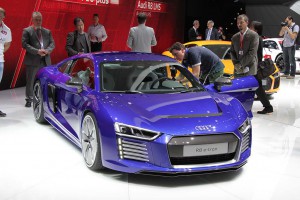
Barely a week after confirming plans to launch the all-electric R8 e-tron sports car at the Geneva Motor Show, CEO Rupert Stadler reveals the luxury carmaker is working on another pure electric model, this one a new SUV that could be designated the Q6.
A teaser image of the electric SUV was presented Tuesday during a corporate briefing in which Audi officials announced they had “delivered more…than promised,” handily setting a new sales record last year. And Stadler made it clear that with the wealth of new products Audi has coming, it expects to set new records.

During a briefing, he said Audi will add a new Q1 model at the bottom of its SUV spectrum, with a “sporty Q derivative,” the Q8 set to top the line-up. But perhaps the biggest surprise was the announcement that Audi would add a pure battery-electric sport-utility vehicle early in 2018.
And unlike most of today’s electric vehicles, which struggle to make 100 miles on a charge, Audi is aiming for “a range of more than 500 kilometers (about 313 miles),” explained engineering chief Ulrich Hackenburg.
That could be bad news for Tesla which hopes to finally get its own battery SUV, the Model X, to market later this year, a full two years behind schedule. The Audi battery-ute would actually deliver slighter better range than the current, top-rated version of the Tesla Model S sedan, in fact.
(Audi sets new global sales record; sets sights even higher. Click Here for that breaking story.)
Hackenburg noted that the new ute will slot in-between the current Audi Q5 and Q7 models and will have “a new, very attractive design, which we are developing especially for the e-tron range,” rather than just stuffing a battery pack into one of the maker’s existing utility vehicles.
It will apparently use a specially modified version of the second-generation Audi modular longitude, or MLB 2, architecture.

As with the Audi R8 e-tron, which will be the top model – from a price standpoint – in the maker’s sports car line-up, the new battery SUV won’t come cheap. Said Hackenburg, “it will be a car which can be used by families that have some money, it is premium.”
(For a closer look at the new Audi R8 e-tron battery supercar, Click Here.)
Audi was initially slow to embrace electrification, putting more of an emphasis on diesel technology. But while it still keeps adding more “oil burners” to the line-up, it is also responding to growing demand for zero-emissions products. That shift could become even more pronounced as a growing number of major urban communities around the world are planning to limit access to their central cities, some planning to bar all but electric vehicles.
Zero-emissions vehicles don’t have to pay London’s congestion charge, for example. Meanwhile, Paris is proposing a ban on diesel vehicles.
During his own presentation, Hackenburg acknowledged that there are some downsides to powering an SUV on batteries. “If I see from the engineering side, a Q is probably not the best solution for an electric car with a large range because it has large surfaces and high aerodynamic resistance,” he noted. But he quickly added that with the growing, global demand for utility vehicles, an electric SUV is a must.
Audi is by no means the only major automaker trying to cut into Tesla’s long-range lead in the battery-car field. In recent weeks, General Motors confirmed it will build a new 200-mile small car tentatively called the Chevrolet Bolt – not to be confused with its plug-in hybrid Chevy Volt. And Nissan’s next-generation Leaf will deliver a similar increase in range, revealed CEO Carlos Ghosn.
(VW Aims to be auto industry’s “Innovation Leader.” Click Here for more.)








I wonder when the EPA will require a realistic mileage range test/claim for EVs where they operate in cold climates with the wipers, heater, etc. in use as is typical? Obviously if you live in some environment that is beneficial to EV operation then you could expect a longer range but many if not most consumers do not live or operate a vehicle in that type of environment.